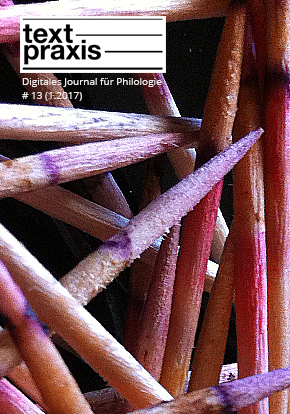Digital Journal for Philology

Textpraxis # 13 (1.2017)
Jennifer Clare tests a synthesis of Stephen Greenblatt and Rüdiger Campe’s text-context approaches to literature in her analysis of Bernward Vesper’s Die Reise, Vanessa Hannesschläger investigates the concrete poetry movement as a ‘European project’, and Hannes Höfer deals with intermediality in literary representations of jazz music.
The paper investigates the depiction of jazz music in the novels Jazz (1927) by Hans Janowitz, Tauben im Gras (1951) by Wolfgang Koeppen, and Thomas Meinecke’s Musik (2004). It scrutinises the basic assumption of musico-literary intermediality that literature is able to present music by telling and showing, which means for example by tonal imitation or structural analogies. However, the relation between literature and music in the above mentioned novels is established by intertextuality. The authors do not search for structural analogies between literature and music but instead use other literature or established writing styles to cast their subject, jazz, in a particular light and attribute it a specific intertextual meaning.
This paper investigates the networks of the writers that can be associated with the concrete poetry movement of the 1950s and 1960s. With reference to theoretical approaches by Sassatelli, Schmale, and Metzeltin, the author makes the case that this world-wide network can be read as a ‘European project’. This article explores the history of concrete poetry and the relationships between concrete writers from across the globe, before Ernst Jandl is introduced as a case study to illustrate the poetological and political dimensions of concrete poetry. Finally, these findings are placed into context with current discourses about Europe.
Research on processes of writing has noticeably broadened its focus since the 1970s, especially concerning material, cultural and intertextual aspects. At the same time, Stephen Greenblatt's concept of cultural poetics has re-modeled the text-context-relationship in literature. This paper seeks to merge two so far independent theoretical approaches – Greenblatt's cultural poetics and Rüdiger Campe's Schreibszene (scene of writing) – in terms of dealing with processes of writing both in their individual and their collective dimension. By looking at a rather complex example of a process of writing (Bernward Vesper's Die Reise [1977]), the complementary potentials of Greenblatt's and Campe's approaches will be demonstrated.
